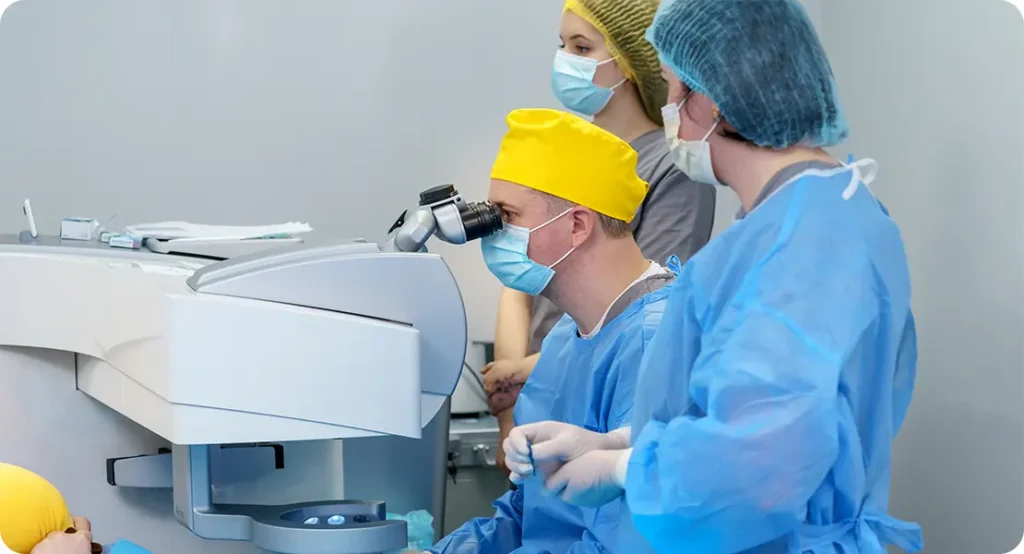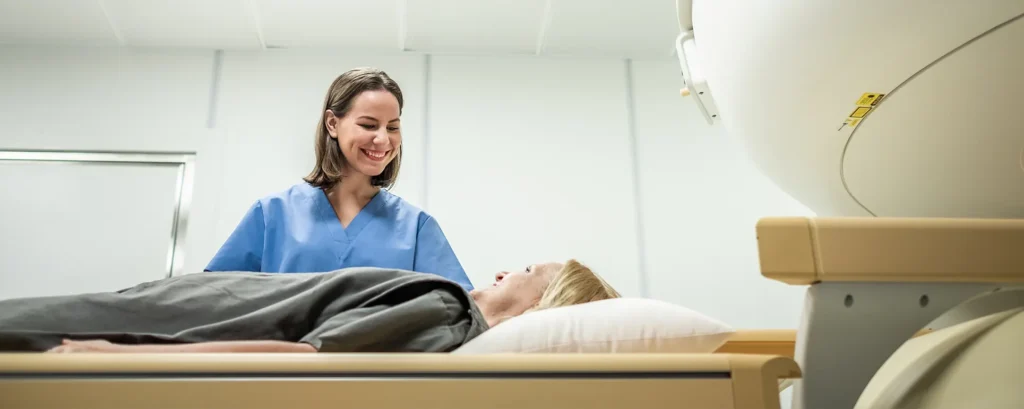Cataract surgery is one of the most common and effective surgical procedures performed worldwide. But what happens when you also have a cancer diagnosis? Can you still undergo cataract surgery while receiving chemotherapy or radiation? Should you wait? Are there extra risks? These are perfectly reasonable questions, and if you or a loved one are navigating both vision loss and cancer, you’re not alone.
In this article, we’ll walk you through how cataract surgery can be planned for people with cancer. We’ll look at how different cancer treatments affect your eyes, when it might be safest to schedule your operation, and what your recovery might look like. You’ll also see how oncologists and ophthalmologists often coordinate care to ensure the safest possible outcome.
Understanding the Interaction Between Cancer and Cataracts
Cancer and cataracts aren’t usually directly related, but certain cancer treatments can increase your risk of developing cataracts. Chemotherapy, radiation therapy, and long-term steroid use are known contributors. Sometimes, the stress of illness itself or treatment-induced nutritional deficiencies can also play a role.
Radiation therapy to the head, neck, or near the eye can accelerate the clouding of the lens. Chemotherapy agents, especially alkylating agents and antimetabolites, may cause oxidative stress in the eye. And corticosteroids, whether taken orally or intravenously, can contribute to posterior subcapsular cataracts even with moderate use.
This means that even if you didn’t have cataracts before your cancer diagnosis, you may notice vision changes during or after treatment. And if you already had early cataracts, cancer therapies may make them worse sooner.
Can You Have Cataract Surgery While Undergoing Cancer Treatment?

In many cases, yes. But the decision is never made lightly. Timing and medical stability are key. Cancer patients often have compromised immune systems, especially during chemotherapy, which can increase the risk of infection after any surgery.
If you’re actively receiving treatment, your oncologist and eye surgeon will assess your current blood counts, immune status, and general wellbeing. They’ll want to be sure you can heal properly and withstand even a minor procedure. In some cases, cataract surgery might be postponed until your immune system recovers or you’re in remission.
For others, especially if the cataracts are severely affecting quality of life, surgery may go ahead with extra precautions. These include scheduling the procedure during treatment breaks, adjusting medications, and monitoring recovery more closely.
Steroid Use in Cancer Care and Its Role in Cataract Formation
Steroids are often part of cancer treatment plans. They can help reduce inflammation, manage chemotherapy side effects, and treat certain cancers directly. However, long-term use or high doses can significantly increase the risk of cataracts, particularly posterior subcapsular types.
If you’re on steroids as part of your cancer management, your eye surgeon will take this into account. They may detect signs of cataract progression sooner, prompting earlier discussions about surgery. The key is to balance the essential benefits of steroid therapy with regular eye monitoring.
In some cases, switching steroid formulations or reducing dosage may be possible. But if your vision becomes significantly impaired, cataract surgery becomes the more practical solution. Fortunately, steroid-induced cataracts are generally very treatable with surgery.
How Chemotherapy Affects Cataract Surgery Planning
Chemotherapy doesn’t just target cancer cells; it can affect your body’s healing and immune systems more broadly. That’s why one of the main concerns around cataract surgery during chemo is increased susceptibility to infection.
Most eye surgeons will prefer to wait until your neutrophil count and overall immune profile have recovered. This often means planning surgery during a treatment break or after completing chemotherapy. Your oncologist might adjust your cycle slightly to allow a safer window for surgery.
If your chemotherapy regimen is ongoing and you have urgent visual needs, a risk-benefit discussion will be had. Some types of chemo are milder on immune function than others, so it’s not a one-size-fits-all answer. Recovery might also be slower, so you’ll need close follow-up.
The Role of Radiation Therapy in Cataract Risk

Radiation near the eyes or brain, such as for certain head and neck cancers, can directly contribute to cataract formation. The lens of the eye is highly sensitive to ionising radiation, and even relatively low doses can increase the risk.
The timeline varies: cataracts may form gradually over months or years after radiation. If you’ve already received radiation and are starting to notice cloudy or blurry vision, it’s worth getting a full eye assessment.
When cataracts are radiation-induced, they’re often posterior subcapsular and can be more visually disruptive even in the early stages. But the good news is that they respond well to surgical treatment, just like age-related cataracts.
When Is the Best Time to Have Cataract Surgery if You Have Cancer?
There’s no universal answer to this, but timing is crucial. Ideally, cataract surgery should be scheduled when your cancer is stable, your immune system is functioning well, and you’re not experiencing severe fatigue or other systemic symptoms.
For patients who are between cycles of chemotherapy or in remission, that’s often an ideal window. Your body will have a better chance of healing quickly, and the risk of complications is lower. For those receiving palliative care or long-term maintenance therapy, decisions are made based on quality of life priorities.
You don’t need to wait until the cancer is “completely gone” unless advised otherwise. Many people undergo successful cataract surgery during cancer recovery or even active treatment with the right support.
What Are the Surgical Risks in Cancer Patients?
Cataract surgery is generally low-risk, but if you have cancer, there are a few additional considerations. The main concerns are delayed wound healing, increased risk of infection, and altered drug metabolism that could affect anaesthetic safety.
If you have low platelet counts, there’s also a risk of bleeding, even though the incisions in cataract surgery are tiny. Some patients may need preoperative blood work or treatment adjustments.
Your surgical team will take all these risks into account and tailor the anaesthesia, medication, and follow-up accordingly. Most importantly, they’ll coordinate with your oncologist to ensure every step is as safe as possible.
Recovery After Cataract Surgery in Cancer Patients

Recovery may be slightly slower if you’re still undergoing cancer treatment, but many people heal without issue. You might need a longer course of antibiotic drops or more frequent follow-up visits.
The usual instructions still apply: avoid rubbing your eyes, keep the area clean, and use your prescribed eye drops regularly. Let your team know if you develop any signs of infection like increased redness, pain, or discharge.
Nutrition and rest are especially important during recovery. Eating well and staying hydrated will help your body heal, as will avoiding any strenuous activities for a couple of weeks. Keep your oncologist informed of your recovery progress, too.
Coordinated Care: Oncologist and Ophthalmologist Collaboration
The safest outcomes come from good teamwork. Your eye surgeon and oncologist should communicate about your treatment schedule, lab results, and any concerns that might affect surgery.
You might also need input from your GP, anaesthetist, or even a haematologist depending on your health profile. Don’t hesitate to ask your providers to coordinate; this collaboration is standard practice for complex cases like yours.
A multidisciplinary approach not only reduces risks but ensures that your vision care doesn’t get overlooked during cancer treatment. Restoring sight can significantly improve your quality of life, even in the middle of an otherwise difficult health journey.
Cataract Surgery in People with Terminal or Advanced-Stage Cancer
For patients with a terminal diagnosis, the goal of cataract surgery shifts from long-term vision restoration to improving current quality of life. If your prognosis is limited but your vision is affecting your ability to enjoy daily activities, surgery may still be worthwhile.
These decisions are deeply personal. Some may opt to avoid surgery and manage with magnifiers or lighting aids. Others may want the benefits of clearer sight even if it’s for a limited time. The surgical risks are typically still low, and procedures can often be done under local anaesthetic with minimal stress.
It comes down to whether the benefits of improved vision outweigh the temporary burden of undergoing surgery. Your care team will help you evaluate your options in a supportive and honest way.
FAQs
- Can cataract surgery be performed during chemotherapy?
Yes, it can, but it depends heavily on the timing and your overall health. Surgeons typically prefer to wait for a period during which your immune system has recovered enough to handle the procedure safely. Chemotherapy can lower your white blood cell count, making you more prone to infection, which is a key concern after any surgery. If the cataract is severely affecting your quality of life, your oncologist and ophthalmologist may coordinate to find a window during a chemo break when the risks are lower and healing potential is better. - Do all cancer patients eventually get cataracts from treatment?
Not all cancer patients develop cataracts, but certain therapies do increase the risk. Prolonged steroid use, head or neck radiation, and some chemotherapy drugs can contribute to cataract formation, particularly posterior subcapsular types. That said, every person responds differently to cancer treatment, and some may never experience significant vision changes. Regular eye check-ups during and after treatment are essential to detect early signs of cataract and intervene before it begins to interfere with daily life. - Is it safe to have cataract surgery while on immunotherapy?
In many cases, yes — cataract surgery is still possible for patients on immunotherapy. Unlike chemotherapy, which suppresses the immune system, many immunotherapy agents work by stimulating immune activity. However, each drug acts differently, and your oncologist will evaluate whether your current therapy could pose risks for healing or increase inflammation. With careful coordination between your cancer care team and ophthalmologist, surgery can often be timed and managed effectively without interrupting your treatment plan. - Will cancer medications affect my recovery from eye surgery?
Some cancer medications can affect recovery, especially those that interfere with immune function, blood clotting, or wound healing. Your ophthalmologist will assess which drugs you’re on and may adjust the post-operative care plan to compensate. For instance, you might need a longer course of antibiotic drops or more frequent follow-up visits to check for signs of infection or inflammation. The key is to ensure your body is in a stable enough state to heal efficiently from the procedure. - How soon after cancer treatment can I have cataract surgery?
The timing depends on the type of cancer, the treatments you’ve received, and your current health status. Some people can proceed with surgery just a few weeks after completing treatment, especially if their immune system has recovered and they’re otherwise stable. Others may need to wait longer, particularly if their blood counts are still low or they’re experiencing fatigue or ongoing side effects. Your oncologist will often recommend blood tests and a general health review before giving the go-ahead for surgery. - Are the visual results from cataract surgery the same for cancer patients?
In general, yes — most cancer patients achieve the same excellent vision outcomes after cataract surgery as the general population, provided the cancer hasn’t affected the eye itself. As long as the retina and optic nerve are intact and healthy, removing the cloudy lens should restore clear vision. However, if cancer or its treatment has damaged the back of the eye, results may vary. Your surgeon will conduct a detailed eye exam beforehand to assess the likely benefits and set realistic expectations. - What if I’m too weak to go under general anaesthetic?
Fortunately, cataract surgery usually doesn’t require general anaesthesia. Most procedures are done using local anaesthetic eye drops with or without mild sedation, meaning you stay awake but comfortable during the operation. This makes it a low-stress option even for patients who are frail or have underlying health issues. If you’re very unwell, your ophthalmologist and anaesthetist will evaluate the safest approach to keep you relaxed and stable throughout the procedure. - Do I need special aftercare if I have cancer?
Yes, you may need slightly modified aftercare to ensure a smooth recovery. This could include longer courses of antibiotic or anti-inflammatory eye drops, more frequent post-op visits, and extra attention to hygiene to reduce infection risk. If your immune system is compromised, healing might take a bit longer, so your care team will monitor closely. Maintaining good nutrition, resting adequately, and reporting any signs of infection early can also help support your recovery. - Can I have cataract surgery if I’m receiving palliative care?
Yes, many patients in palliative care still undergo cataract surgery if it improves their quality of life. The decision depends on your overall health, goals of care, and whether vision loss is significantly affecting your ability to read, watch TV, or recognise loved ones. The surgery itself is low risk and minimally invasive, and it’s usually done under local anaesthetic. Even for patients with limited life expectancy, clearer vision can bring meaningful comfort and dignity in day-to-day life. - How do I start the process if I have cataracts and cancer?
The first step is to speak with your oncologist, who can assess whether you’re medically stable enough for surgery. If they agree, they’ll refer you to an ophthalmologist for a detailed eye examination. From there, the eye surgeon will determine how urgent the cataract surgery is and will collaborate with your cancer team to find a suitable time for the procedure. The key is ongoing communication between all parties to ensure your safety and optimise your visual outcome.
Final Thoughts
Cataract surgery is very much possible for people with cancer, but it requires thoughtful planning. By understanding how treatments like chemotherapy, steroids, and radiation affect your eyes, and by working closely with your medical team, you can make informed choices about your vision.
Even in complex health situations, restoring sight can be a meaningful step toward greater independence and wellbeing. At London Cataract Centre we regularly collaborate with oncology teams to ensure the safest and most effective care for patients navigating both cancer and vision loss. If cataracts are interfering with your quality of life, speak to your oncologist and book an eye consultation. You don’t have to wait in the dark.
References
1. Khurana, R.N. et al., 2019. Outcomes of cataract surgery following radiation treatment for retinoblastoma. Journal of AAPOS, 23(4), pp.220–224.
Available at: https://www.ncbi.nlm.nih.gov/pmc/articles/PMC3033780/
2. Mohamed, M.O. et al., 2022. Ocular adverse events associated with immune checkpoint inhibitors: a comprehensive review. Journal of Ophthalmic Inflammation and Infection, 12(21).
Available at: https://joii-journal.springeropen.com/articles/10.1186/s12348-022-00321-2
3. Khurana, R.N. & Greenberg, A., 2016. Results of cataract surgery in cancer patients receiving chemotherapy. Investigative Ophthalmology & Visual Science, 57(6), p.836.
Available at: https://iovs.arvojournals.org/article.aspx?articleid=2560523
4. Michiels-Silva, T. et al., 2022. Neuro‑ophthalmic immune‑related adverse events linked to checkpoint inhibitor therapy: a systematic review. Frontiers in Ophthalmology, 3(104490).
Available at: https://www.frontiersin.org/articles/10.3389/fopht.2022.1044904/full
5. Esmaeli, B. et al., 2023.Incidence and risk factors for cataract following plaque brachytherapy for uveal melanoma. Retina, 43(2), pp.221–227.
Available at: https://www.sciencedirect.com/science/article/pii/S2405844023106554

